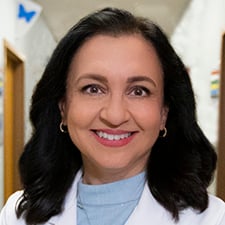Years of advocacy have paid off in Mississippi, with passage of a new law that extends Medicaid postpartum coverage from only 60 days to a full year and will result in healthier mothers and babies—which one pediatrician says will result in healthier families overall.
“Giving a mom health care coverage for 12 months” helps create the ‘welcome mat’ effect,” said AMA member Anita S. Henderson, MD, a pediatrician with Hattiesburg Clinic. “If you have coverage, it improves the likelihood you will use it for yourself and seek care for your children.”
Hattiesburg Clinic is a member of the AMA Health System Program, which provides enterprise solutions to equip leadership, physicians, and care teams with resources to help drive the future of medicine.
“The extension of Medicaid coverage is a major step to improving the health of new mothers and infants in Mississippi,” said John Cross, MD, president of the Mississippi State Medical Association (MSMA). “We appreciate the leadership of our Mississippi physicians and the organizations that worked alongside MSMA to advocate for our patients. We commend the governor and legislature on moving this bill forward into law to improve health care in Mississippi.” Dr. Henderson, who is the immediate past president of the American Academy of Pediatrics’ Mississippi chapter, said the legislation spent years in legislative limbo. When the bill finally came to a vote, it received overwhelming support in the state legislature. Gov. Tate Reeves signed the measure March 16.
The MSMA’s advocacy for Medicaid postpartum coverage extension to 12 months began several years ago.
With the introduction of SB 2212 in 2023, MSMA intensified efforts in advocating for the much-needed extension of postpartum coverage. MSMA elevated physician voices on this issue with a Day at the Capitol on January 26 and a press conference on February 22, at which Dr. Henderson and Dr. Michelle Owens presented—giving both the pediatrician and obstetrician points of view.
This press conference gained state and national attention. Thereafter, Mississippi physicians responded to a call to action and inundated members of the Mississippi House of Representatives with calls and emails in support of the legislation, the MSMA said.
MSMA extended thanks and appreciation to state Sen. Kevin Blackwell, author of SB 2212, and state Rep. Missy McGee, who successfully shepherded SB 2212 through the House. Gov. Reeves was thanked for signing the bill “in support of Mississippi moms and babies.”
Physician advocacy efforts paid off
Dr. Henderson, who is also an MSMA member, credited Lt. Governor Delbert Hosemann and Blackwell, who chairs the Mississippi Senate Medicaid Committee, with helping to build support for the measure by holding several hearings on maternal and child health at which Dr. Henderson and others testified.
Others presenting at the hearings included AMA members J. Martin “Marty” Tucker, the University of Mississippi Medical Center (UMMC) chair of the department of obstetrics and gynecology; Mobolaji Eniola Famuyide, MD, chief of UMMC’s division of newborn medicine; and Daniel Edney, MD, Mississippi’s state health officer.
The hearings reiterated the need to improve maternal health outcomes in Mississippi. Meanwhile, 2019 data shows that 8.7 in 1,000 infants born in Mississippi died before their first birthday. Three in five births in 2020 were to women covered by Medicaid, the March of Dimes says.
Also, Mississippi’s maternal mortality ratio was 36 maternal deaths per 100,000 live births between 2017–2019, according to the Mississippi State Department of Health.
Five rural hospitals have closed in Mississippi since 2005, 48 have reduced services and 28 (38%) are at risk of closing, according to a Center for Healthcare Quality and Payment Reform report.
Institutions that have reduced services include Greenwood Leflore Hospital, in Greenwood, that recently closed its labor and delivery unit and primary care clinic, and Delta Health-The Medical Center, in Greenville, which closed its neonatal intensive care unit, according to Mississippi Today.
“All of those things resonated with lawmakers,” Dr. Henderson said, but she added that coverage is “just one part of health care—we also have to make sure that these women have access in a timely fashion.”
This means working to lower Mississippi’s physician shortage.
Advocacy work needs to continue
The new law will take effect July 1, 2023. Before then, the word must get out to ob-gyns, family physicians, pediatricians and mothers that coverage has been extended.
“This is something new,” Dr. Henderson said. “So, we will have to educate, advocate, and explain it to our mothers who previously had babies, but did not have this benefit.”
Advocacy will take the form of providing oversight on how the state implements the law, particularly if the benefits are administered through Mississippi’s Medicaid managed care program. This includes keeping an eye on data pertaining to quality metrics. wellness, and postpartum visits.
“Now that we passed postpartum care, we need to make sure that it’s being implemented and used in the right manner to improve outcomes,” Dr. Henderson explained.
This includes monitoring for and treating postpartum depression, anxiety, hypertension, diabetes, and cardiovascular disease as the mother’s health is critical to her baby’s development.
“A baby’s brain doubles in size in the first year of life, so that’s the time when they most need that interaction,” Dr. Henderson said. “Babies who are talked to and read to have better language skills going into kindergarten. Talking, reading, singing, and interacting is critical during that first year, but mothers who are sick, depressed, or have chronic medical conditions are less likely to be able to interact and care for their baby in the best manner possible.”
Extending coverage also gives new mothers more opportunities to see their physicians if, for one reason or another, they didn’t schedule an appointment within that 60-day window.
“Often, they’re taking care of everyone but themselves,” Dr. Henderson said.
Learn how the AMA advocates to improve maternal health.




